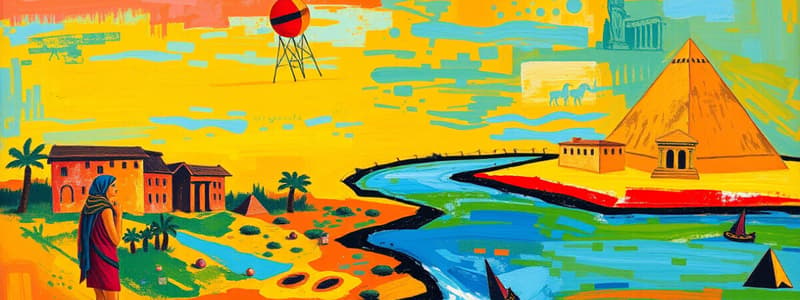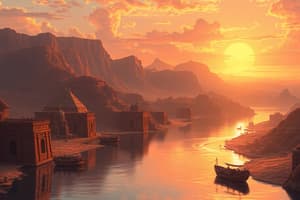Podcast
Questions and Answers
Why was the desert beneficial for ancient Egyptian civilization?
Why was the desert beneficial for ancient Egyptian civilization?
It formed a barrier against enemies.
What tools were commonly used in ancient Egypt for farming?
What tools were commonly used in ancient Egypt for farming?
Sickles and grinding stones.
Where does the Nile River empty?
Where does the Nile River empty?
The Mediterranean Sea.
What significant cultural belief did Sumerians hold regarding their gods?
What significant cultural belief did Sumerians hold regarding their gods?
What counting system did Babylonian mathematicians devise?
What counting system did Babylonian mathematicians devise?
What do we call the massive stone structures, with the most famous being Stonehenge?
What do we call the massive stone structures, with the most famous being Stonehenge?
What is the name of the writing system used in ancient Egypt?
What is the name of the writing system used in ancient Egypt?
What are the three waves of Egyptian culture?
What are the three waves of Egyptian culture?
Flashcards are hidden until you start studying
Study Notes
The Life-Giving Nile
- Sickle and grinding stones were essential agricultural tools in ancient Egypt.
- The Sahara Desert served as a natural barrier, protecting Egypt from invasions.
- The Nile River flows into the Mediterranean Sea, providing vital resources and trade routes.
- The Egyptian calendar began with a significant date of 4236 B.C.
Mesopotamia and Babylonia
- The climate of Mesopotamia significantly influenced human development and settlement patterns.
- Known as "the land between the rivers," Mesopotamia is situated between the Tigris and Euphrates rivers.
- Sumerians are credited with the invention of the wheel and the development of wheeled vehicles.
- For Jews and Muslims, Mesopotamia holds great historical significance as the birthplace of humanity.
- Sumerians believed that their gods inhabited physical structures called temples or houses.
- Modern-day Iraq corresponds with ancient Mesopotamian civilization.
- Babylon emerged as a prominent city-state during the sixth century, known for its grandeur.
- Babylonian mathematicians created a base-60 counting system, influencing time and geometry.
The Mysterious Megaliths
- Megaliths are large stone structures, often associated with ancient cultures and rituals.
- Stonehenge is the most renowned megalith, known for its intricate arrangement of stones.
- Each massive stone at Stonehenge can weigh as much as 50 tons, showcasing impressive engineering.
- The Anasazi people believed their ancestors emerged into the world through a small celestial opening.
- The Inca civilization of Peru referred to themselves as "The Children of the Sun," emphasizing their connection to the sun deity.
The Flowering of Egypt
- The Nile River was the main source of sustenance and agriculture for ancient Egypt.
- Egyptian culture progressed through three main periods: The Old Kingdom, The Middle Kingdom, and The New Kingdom.
- Egyptians held a belief in eternal life, relying on the preservation of their bodies to achieve it.
- Hieroglyphics is the writing system used by ancient Egyptians, characterized by pictorial symbols.
Studying That Suits You
Use AI to generate personalized quizzes and flashcards to suit your learning preferences.




